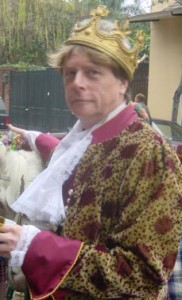 What will I do with him, this dreary boarder who sulks across from me at the dining room table night after night? Years ago, when I was down on my luck, I thought he’d only be staying for a few months, and now I can’t get rid of him. He doesn’t want to go out drinking and dancing until dawn to the techno beat, and what is worse, he doesn’t want me to, either. What in the world is wrong with him?
What will I do with him, this dreary boarder who sulks across from me at the dining room table night after night? Years ago, when I was down on my luck, I thought he’d only be staying for a few months, and now I can’t get rid of him. He doesn’t want to go out drinking and dancing until dawn to the techno beat, and what is worse, he doesn’t want me to, either. What in the world is wrong with him?
“You’ll just come home alone, stinking of booze and smoke,” he warns me while I’m rummaging through my closet for just the right T-shirt. “Aren’t you getting too old for all that? I mean, go look at yourself in the mirror. And don’t squint.”
What he’d rather do is to stay home, listen to old Jacques Brel records, sip a glass of wine, read, and maybe phone an old friend. If he stays up really late, he has discovered, he can catch people in Europe while they’re having breakfast. He’s always thinking of Europe, swearing that at his age, one can finally appreciate civilization. “So unlike,” he says, raising an eyebrow, “you savages.”
Who is this stranger who follows me around, someone whom people call “sir” and refer to as “this gentleman”? He scares away the wild young sex pots that I’m dying to lay my hands on. He claims that he’s tired, and always has symptoms of this and that, never anything serious but at the moment he swears it will be the death of him. He won’t get out of my sight, and glares at me with his wrinkled face, putting on and taking off his glasses while he makes lists of important things to do.
I’ve had it with him and his importance. Sometimes I want to run out of the house just to escape his all-knowing looks and resigned sighs. I want to twist, shout, and holler in the streets with people who don’t know him. But whenever I do bring home wild young things, they may go to bed with me but they wake up with him. After one look at the dreary boarder, I never see them again.
Who is this grizzled guest I have to put up with in my own house? He never lets me forget that he pays the rent and that if it weren’t for him, I’d be out on the street. I can ignore him, challenge him, mock him behind his back, and even hurt him, but he’s still there to haunt me. He observes me to see if I’ve straightened out, shaking his head at my carefree ways, breathing down my neck with the sour breath of his so-called “wisdom.” He’s happy if I let him read the newspaper and take a nap after dinner, and if I promise to wash the dishes. He’s like the ghost of my father, or even worse, my mother. “That ivy needs water,” he tells me, “there’s a spot on the rug, and the light bill isn’t paid.” Who cares, I wonder, as I water the plant, vacuum the rug, and write the check.
The dreary boarder does.
Time was, I remember, when I lived in bamboo huts on foreign shores, brown as a pecan and blond as chamomile, with two pairs of cut-offs to my name and someone lovely to share my bed every night. Time was when a joint, a book of poetry, and a beach mat was all I needed. My only fortune was a basket filled with seashells and a thin wad of travelers’ checks. The dreary boarder never believes it, but I was happy.
“Those days are gone for good,” he says, pouring himself another glass of French wine.
“The sea isn’t gone,” I insist, “or poetry, or cheap bamboo huts where a traveler can rest.”
He looks me up and down. “Wouldn’t you look cute limping along the sand, gut hanging over a batik sarong, as you pop blood-pressure pills and try to remember where you left your reading glasses. And that uncomfortable little cot wouldn’t squeak to the music you remember, I assure you. Grow up.”
I agree with the dreary boarder that one day I should grow up. But when I do, I’m sure that I’ll never be anything like him.
